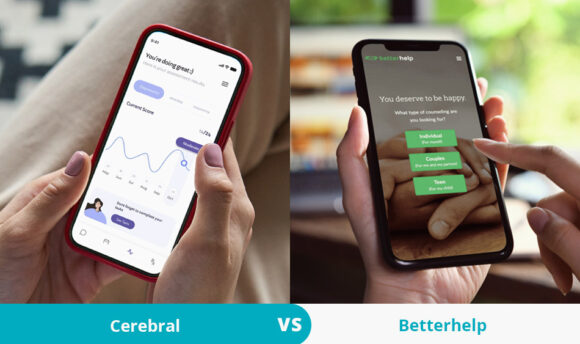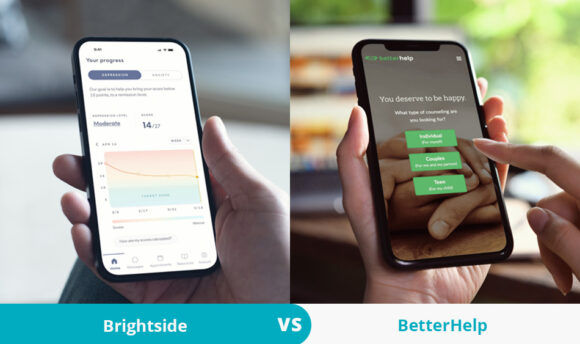How do we vet brands and products? Learn more.
7 Best Cerebral Alternatives to Invigorate Your Mental Health
Cerebral is an accessible and efficient alternative to in-person therapy. But how does it compare to other mental health management platforms on the market?
Finding professional help to manage your mental health can be difficult and expensive, particularly in locations where therapists have long waiting lists.
However, the rise of remote monthly-subscription mental health platforms has allowed a wider audience to access services more easily. One such platform is Cerebral, which offers treatment programs, online therapy, and medication management services to patients.
However, if the medication management, online therapy, or self-help resources provided by Cerebral just aren’t working, there are many alternative Cerebral options that may be a better fit for you.
Read on to take a closer look at the pros, cons, and features of the top 7 apps.
Top 3 Alternatives to Cerebral


- Offers regular sessions with a licensed therapist
- Option to receive anonymous therapy
- Possible to participate in group sessions for peer support

- Medication management
- Self-guided app with 400+ therapy sessions
- Video, message, and live chats

- Scientifically-backed mindfulness activities and meditations
- Quick relief sessions
- Includes a sharable daily mood tracker
#1 BetterHelp – Best for a wide range of conditions

- Private video calls with a licensed therapist
- Digital self-help worksheets to complete outside of sessions
- Group therapy sessions
- Online journal
BetterHelp offers users a large network of licensed therapists who are experienced in a range of mental health issues, from anxiety and childhood trauma to attention deficit hyperactivity disorder (ADHD) and post-traumatic stress disorder (PTSD).
After completing a short questionnaire on your needs and preferences, the service will assign you a therapist. You can then choose the mode of communication which is best for you, whether you prefer phone and video calls or messages and live chats.
BetterHelp does not offer medication management services, which may be a problem for users with ADHD who require stimulant medications, for example. It is estimated that 2.5% of adults in the US require ADHD medication.
However, their subscription costs are lower than most of the other Cerebral top alternatives and range from $60–90 per week.
-
Experienced therapists on hand 24/7
-
A range of mental health professionals to choose from
-
Budget-friendly option
-
Unable to access medication
-
Fees cannot be paid with mental health care insurance
#2 Talkspace – Best for people under 18

- Medication management
- Self-guided app with 400+ therapy sessions
- Video, message, and live chats
Founded in 2012, Talkspace is an online web and app-based therapy service. It provides therapy sessions for various people, from individual adults and worried couples to teens (aged 13–17) and military veterans.
After choosing a therapist, you will meet with them for a weekly check-in. Your therapist will also be available whenever you need them through Talkspace’s online messaging feature.
However, one of the drawbacks of Talkspace over other apps is that these live meetings only last for 30 minutes. Although short therapy sessions for children may be beneficial, they may not be long enough for those needing to delve deeper into their problems.
Progress tracking is an important part of keeping you motivated throughout your mental health care journey, and Talkspace allows you to do just that with its goal-setting and progress report features.
Alongside regular meetings with your therapist, you will also have access to sessions on the Talkspace self-guided app. These can be worked on in your own time and help with everything – from depression and anxiety symptoms to relationships and parenting.
-
Accepts payment from health insurance providers
-
Offers therapy for teenagers
-
Guaranteed response time from your therapist at least 5 days per week
-
Live therapy sessions are short (30 minutes)
-
Users sometimes receive automated, impersonal messages from counselors
#3 Sensa – Best for mental health maintenance

- Lessons based on the CBT method
- Mood journal
- Challenges & self-improvement activities
- Quick relief function
- Assessments to help you grow
Sensa is a mental health management app based on the principles of cognitive behavioral therapy (CBT), a form of talking therapy that is highly successful in treating anxiety.
The app builds a customized 84-day plan, which is designed to help every user understand their unique mental health needs and how best to support themselves.
It also provides subscribers with daily lessons about how their thoughts and emotions may be causing self-destructive behaviors. The lessons are split into 4 groups, which are physical, health, mindfulness, and relaxation.
These lessons can be completed in your own time, along with 10–30-minute activities that are designed to help you build healthy habits and routines.
You can also track your emotions in Sensa’s online mood journal and complete a DASS-21 depression, anxiety, and stress self-evaluation survey at the end of each week. This will allow you to see how your outlook on life is developing as you progress through the app.
-
Caters to a range of mental health conditions
-
Helps to form new healthy habits
-
3 subscription plans to choose from
-
You can add custom exercises to suit your unique needs
-
Paid app
-
No free trial
-
Text-heavy
#4 Lasting – Best for couples

- Learning modules called “Series,” which can be completed at your own pace
- Live Zoom workshops led by trained therapists
- AI guidance to support you through each learning module
Lasting is a guided therapy app designed specifically for marriage counseling to ensure that couples can maintain healthy relationships and learn to overcome burnout. The app also offers a guided parenting program to help improve communication between parents and their children.
Although Lasting is owned by Talkspace, this app offers no one-to-one counseling sessions. Users will work with an AI bot, which guides them through a series of exercises designed to strengthen their relationship. These learning modules are called “Series” and can be completed at your own pace.
At the end of each Series, you will complete a quiz and share answers with your partner. This encourages couples to have honest discussions about intimacy, parenting, and various other relationship-based topics.
If you are interested in the app but not ready to commit, Lasting has a free version. However, you can only complete one Series before you need to upgrade to Premium.
-
Work can be completed at your own pace
-
Accessible to more than one user, meaning that couples can work together
-
Encourages open and honest conversations between couples
-
No one-to-one counseling sessions
-
Lack of personalization
#5 Happify – Best for quick therapy sessions

- Offers a variety of self-guided learning “tracks” and in-app games
- Many activities can be completed in 5–15 minutes
- A range of guided meditations
Happify uses principles of positive psychology and mindfulness to help users across the world take control of paranoid thoughts that may be negative or harmful.
When using the app, you will take part in a series of quick, fun, and engaging activities, making Happify more of a light-hearted mental health app than others.
One of the advantages of Happify as a Cerebral alternative is that the free version offers several learning “tracks,” quick activities, and games for you to complete.
The psychology behind all of these activities will also be explained to ensure that you understand why these tasks are beneficial to your mental health. Happify is a great option for those looking for fun and free activities to improve their mental well-being.
-
Explains the science behind activities
-
Budget-friendly at $14.99 per month
-
Free version available
-
“Tracks” lack a clear structure
-
Might not be appropriate for those with severe mental health conditions
-
No one-to-one counseling
-
The app often glitches and has long loading
#6 Noom Mood – Best for text-based therapy

- Bitesize lessons delivered daily
- Daily mood logging
- One-to-one text-based coaching
Developed by the creators of the popular weight loss program Noom, Noom Mood is an app that helps users become more emotionally aware.
The app is based on a 16-week program that provides daily lessons and mindfulness tools to help you build a happier and healthier life.
These fun 10-minute lessons are delivered by professional coaches on a one-to-one basis, although they aren’t a substitute for live, face-to-face therapy sessions that some of the other Cerebral alternatives offer.
Along with quizzes to help put your skills into practice, you can also keep tabs on your progress with the daily mood tracker.
There is no monthly subscription service available, and instead, users are asked to pay upfront for a 4-month subscription, costing $149.
Although this is a big financial commitment, you can cancel your subscription at any time with a simple message to your coach. You will then receive a full refund for any upfront payments.
-
Friend referral rewards, such as Amazon credit
-
Advice from your personal coach
-
Easy to switch from the Noom weight loss program if you are already subscribed
-
No monthly subscription service
-
No free trial
-
Doesn’t offer face-to-face therapy
#7 Brightside – Best for anxiety and depression

- Zoom sessions with a licensed therapist
- Medication plans
- Additional self-care subscription program
Brightside is a cognitive behavioral therapy app that treats those suffering from anxiety and depression.
What’s great about Brightside in comparison to other alternatives is that it is able to provide users with a medication plan.
After a short survey, Brightside will match you with the mental health professional most suitable for your needs. You can then book a Zoom call to speak with your therapist directly, and if necessary, your prescribed medications will be delivered straight to your door.
If you are looking for further help, the app has a self-care program available. This is based on the Brightside website and provides short lessons in areas such as mindfulness.
Depending on the subscription that you choose, the cost of this app ranges from $95 to $349 per month. This means that there is a program suitable for all budgets.
-
Accepts health insurance as payment
-
You can schedule appointments quickly
-
Caters to all budgets with different programs
-
Medication plans are an additional expense
-
Not suitable for those with more severe mental health conditions
Comparison Table







Experienced therapists on hand 24/7
A range of mental health professionals to choose from
Low cost
Accepts insurance for some services
Couples and teens can access mental health services as well as adults
Guaranteed response time
Caters to a range of mental health conditions
Encourages you to form new healthy habits
Offers 3 subscription plans
You can add custom exercises to suit your unique needs
Work can be completed at your own pace
Can add your partner to your account
Encourages open and honest conversations between couples
Explains the science behind activities
Budget-friendly
Free version
Friend referral rewards
Advice from your personal coach
Easy to switch from the Noom weight loss program
Accepts insurance
Quickly schedule appointments
Caters to all budgets with different programs
No medication management services
Insurance is not accepted
Short therapy sessions
Counselors often send generic messages to all patients
No one-to-one sessions
Paid app
No live or one-to-one counseling sessions
Lack of personalization
Poorly structured
No one-to-one counseling
Frequent glitches
No monthly subscription service
No free trial
Doesn’t offer face-to-face therapy
Medication is expensive
Not suitable for treating severe mental illnesses
How We Picked the Apps
To help our users find the online therapy app for them, we evaluated each of the alternative apps based on 4 categories. These are quality, effectiveness, price, and brand reputation.
Quality
When it comes to your mental health, quality is a key factor in ensuring that you receive the best help possible.
All of the reviewed apps are easy to navigate, work as efficiently, and do not frequently glitch. We also made sure they had a support team dedicated to fixing bugs and addressing complaints as quickly as possible.
Effectiveness
Research has shown that although it is an underutilized resource, therapy is effective in improving quality of life in the long term.
While some of the apps on this list offer science-backed activities instead of online therapy, we believe guided meditation and exercises can also be beneficial for those looking to improve their mental health.
Price
Price is an important factor to consider, as users typically choose online therapy as a cheaper alternative to face-to-face mental health services.
We made sure our list included options for all budgets, but unfortunately, virtually no app offers free online therapy sessions with licensed therapists. If you can’t afford online or in-person therapy, some communities offer free support groups and counseling sessions for those in need.
Brand reputation
Brand reputation is often a good indicator of the quality of products and services.
This is especially true within the health industry, so we picked brands that have an excellent reputation and can typically be trusted to support users as they navigate their mental health care journey.
A Word From a Psychologist
In-person therapy is incredibly effective not only for improving mental well-being but also for helping people understand the underlying causes of their issues.
However, this type of therapy is often expensive. App-based and online therapy are accessible alternatives, which are just as effective as in-person therapy in treating moderate depression and anxiety.
Along with therapy sessions, you should also implement some other positive changes to help improve your mental health on an everyday basis. This could include taking a walk each day, incorporating more fruit and vegetables into your diet, getting quality sleep, practicing meditation, or journaling.
Conclusion
When it comes to Cerebral app alternatives, we think BetterHelp and Talkspace are the two best options. Both of these apps offer access to licensed therapists and counselors who can help with a variety of mental health issues.
While online therapy is a great option for those who may not have access to traditional therapy, it’s important to remember that it’s not a substitute for in-person care. If you need more intensive therapy or if you have a serious mental health issue, it’s important to seek out a qualified professional.

















































 Select your language:
Select your language: 











